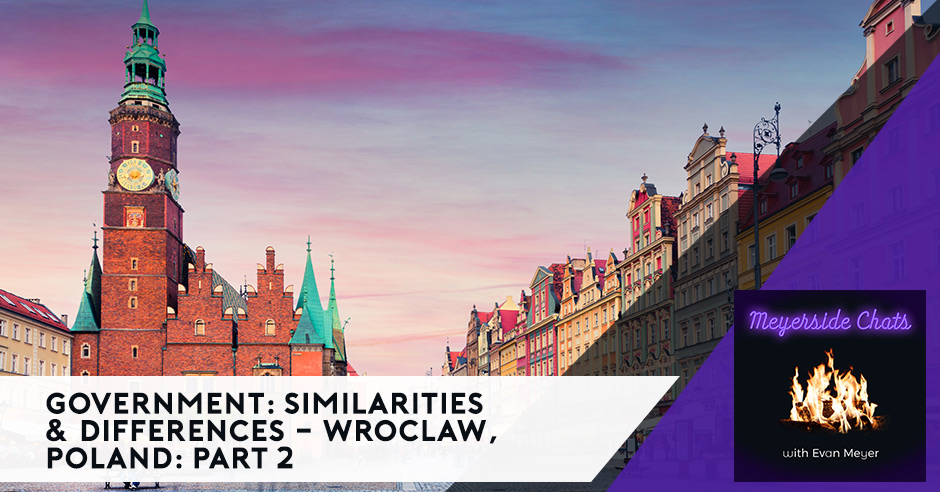
Continuing his deep dive into the local government of Wrocław, Poland, Evan Meyer chats with Councilman Michal Kurczewski. Together, they discuss how their two-party system works and how they solve conflicts when passing mandates. Michal explains why a proper feedback-gathering mechanism must be implemented to ensure every constituent is heard, minimizing huge conflicts and disagreements. He also talks about the issues they face at a local level and how they solve them through impeccable public discourse. Michal opens up about their increased housing fee, the high demand for better public transport (without sacrificing historic landmarks), protecting rivers from hazardous chemicals, and jumping back from the harsh effects of the COVID-19 pandemic.
—
Listen to the podcast here
Government: Similarities & Differences – Wroclaw, Poland: Part 2
Councilman Michal Kurczewski
It’s good to see you.
You too.
Thank you for being here.
Thank you for asking me to come to your show.
This is a wonderful opportunity to be here. I had an opportunity to interview Bartholomew. We had a nice interview and both of you are in different parties of the system. I thought it’d be a great opportunity to start by sharing what does the system look like in local government? What are the two parties and how is it structured relative to your knowledge of how the US is structured?
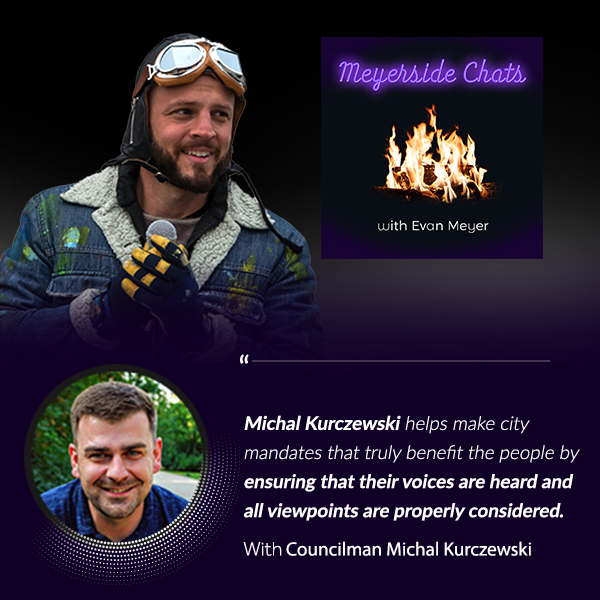
When the president or major in your country is elected, you also vote on the city council members and you also have 37 city council members. If the president or major wants to govern smoothly, he needs to have more than half of the city council members. They need to be with him to cooperate and vote with him.
Also, be in his party essentially?
In practice, yes because the political structure disappeared but different groups cooperated with him. Nowadays, it’s his party.
Is it the governing party? What is the term for this party?
His name is in the party’s name. Theoretically, it’s not political, but in some ways, it is political.
It’s the Jacek Sutryk Party.
The other part which views some aspects of the local government policies differently and this party has its own program or views things differently but not always because we vote together as well. Some acts of local law are voted together and we all say yes in harmony. There are some conflicts, but these are not very political conflicts because if you have conflict, you should have some environmental area somewhere and not have an industrial area somewhere or you say, “This road should be designed and built in this place and not in the other place.” It’s not very political. It’s local. Most of the time, if we argue or if we have conflict, it’s very local.
It’s a localized conflict. Are you saying you tend to stand together on bigger issues?
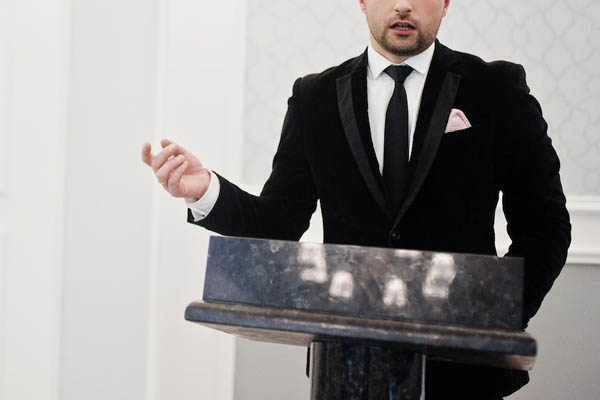
There are things that we agree with and things that we don’t agree with. I’m not saying that it’s all the same everywhere, but the president has their own team. They work on some projects and in this project, we get information five days before it’s voted. It’s not that everybody is working on it.
The president’s team isn’t just a party.
I’m not saying that it’s all the time like that, but probably his own city council members and the ones who cooperate with him can help him to govern, they also might be surprised with this project because this is how things are done and it’s not the best way. It’s easy to have conflict and have people who are against you. There should be a lot of compromise in the policies and projects. Different views should be taken under consideration and should try to go between and the potential for conflict is limited.
Is one of the facts that there are only five days, as you said?
No.
Is the timing part of the issue?
I’m not saying that it’s five days, but more or less because we get together and we have what is called a commission and there are different topics. The planning commission and environmental, etc. Those commissions talk about different projects and either vote yes or no. We have a city council meeting where we all gather and then we vote. I’ve read about your local government in Los Angeles. It seems that it works differently because your city council has fifteen members.
I reside in Santa Monica, so I’m super familiar with how Santa Monica works. I’m generally familiar with LA.
We have fifteen city council members and those city council members are more or less employees because every week they come. They have a salary to work. In Poland, it’s different. We meet once or twice a month. It’s a bit different. There are some similarities.
You’re not paid employees.
We get the money that’s a refund to us of our expenses or something like that. It is not exactly a salary. It’s something in between.
It’s closer to Santa Monica, the way that you work, which is interesting because your size is quite large. It’s something like 700,000 and 1.5 million in the metro area or something like that. Santa Monica is 90,000 or so.
Nowadays, it’s probably more or less 1 million because when the conflict in Ukraine started, people started to come to the city center area and not the surrounding area in a geographical way.
[bctt tweet=”City councils must consider different views and try to go in between them. This way, the potential for conflict can be limited.” username=””]
You do have more of a similar setup with Santa Monica. Santa Monica has seven council members and then the mayor gets voted by the council, not by the public. You’re almost halfway between and they don’t get paid. They get $12,000 a year or something. Two meetings a month.
There are some similarities.
It’s still a full-time job because it’s intensive if you want to do it right.
There are many issues and different views. People want different things. It’s a very complicated organism.
What is your full-time job?
I think that 90 or 95% of the city council members work somewhere. If they are retired, they just get the pension and they don’t work. Nowadays, I work in marketing and this is my full-time job but there’s some time and there’s time for the city council. This is how it works.
There are 2 or 3 parties that currently dominate in your council out of the 37 members, right?
Yes, that’s us.
Law and Justice.
My group of city council members and there’s also a second group. There are two parties, let’s say and the party of Jacek Sutryk. There are three political teams or groups. The one that was close to Jacek Sutryk split over time and they are in opposition.
We talked about that.
It’s not one-to-one. Yes, they are. We vote together as well.
Are they the same parties at the state level generally? Is that similar?
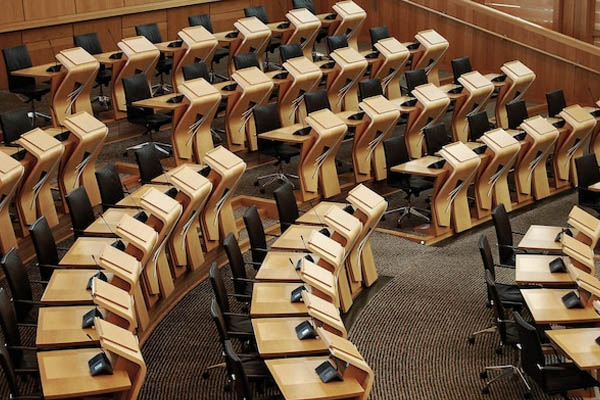
Not really.
It’s different.
Yes. All city council members have their political views, but it’s not like in the parliament. They’re all called the same.
Tell me a few issues that you’d say you agree on at the local level and maybe a few issues that you don’t. What would you say some of those things are in general?
That’s still the problem and we had some issues with a municipal entity that governs public housing. They’ve increased fees. In the opinion of many people, the level is too high. It’s hard to find a real cost for that because we have inflation. It was a big increase. This is an issue. This is a problem. Many people are angry about it and this municipal entity or company is owned by the city. It makes money. It is zł8 million or zł9 million of profit. This profit should stay in because of the people. This is how this municipal entity should work. This was a conflict. We see differently.
You all agree that inflation’s an issue but you don’t agree on something.
On the level of the increase of fees. This municipal entity, for example, sponsors different sporting teams. People have to pay for that from their pockets. It’s not right. This is an issue. We see differently the way we should travel. We would like to have a compromise and be able not to throw out cars all the time. For many different infrastructure projects, for example, the result is that you have fewer cars in the city.
I know that from the ecological point of view, you should have fewer cars, but in practice, you need to travel with your kid to school. You need to do shopping, etc. You can do it, but not in the winter on the bike. It’s not the whole transport. You need to have trams and different buses. You need to have private cars and also bicycles in the city, but we want to have a bigger harmony between all those means of transport. This is, for example, an issue.
Would your party be pushing more on that?
Building, for example, roads but not in the city center because we don’t want to have highways in the city center but we want to have normal traffic in the city and we are one of the cities in which the traffic is the slowest. You spend lots of time in traffic. That doesn’t create good air, so it’s not a good solution. This is, for example, an issue. Also, historical buildings. In your country, it’s called landmarks, right?
Yes, in most places.
We also see this issue or this topic differently because we want to keep as much as possible of the substance of buildings in the city. If we give the private sector too much power, they will take as much profit as they possibly can.
They destroyed landmark buildings. Is that what you’re saying? When you say, they’ll make a profit in relationship to landmark buildings.
[bctt tweet=”Some politicians generate publicity by expressing extreme viewpoints. It may either make them popular or lose some votes of the people.” username=””]
They will keep a part of the building and some people might think that it’s still a landmark, but everything will be taken out. Maybe just the wall, which you see from the outside will be kept.
It’s like the Western Wall in Israel. The whole Temple’s gone, but the wall, they think, is Solomon’s Temple.
Despite the fact that we have laws, which protect those buildings, you still can try to go between the laws and try to leave a small part of the building. This is something that the major of the city has influenced. We argue on that issue and there are many more issues but we don’t argue all the time.
We’re about 1 to 3. We agree on one. We can get to 3 to 3.
We need to, for example, build an infrastructure for a tram, which will enable easy and fast transport from some parts of the city. Probably 95% to 100% of us will say, “Yes, we should do it. Let’s do it.” There are moments and there are fields in which we all agree.
Also, about the river. Wasn’t that a third one that there’s general agreement on?
We heard about the cause, this golden alga.
Can you explain that?
As far as I’m concerned, it grows in the river in some moments. This is the possible cause of the problem. Probably there were some unfavorable factors, which caused that golden alga to appear, but we all agree that we have to make sure that the probability of that issue appearing in the future will be long. We should put more equipment into the river which measures the quality of the water. You should make sure that you don’t put anything into the water, which the government doesn’t know about.
If you do it, you need to have a special agreement and the government needs to know what you are putting into this water. It’s a local problem. It’s a problem at the state level. Also, it’s a problem of mentality. We need to all agree that this is something precious and we need to make sure that we will all keep an eye on that.
We won’t agree when we know that somebody’s putting something into the river because not all areas in Poland have sewage treatment plants. We need to make sure that every area will have it and that all the industries will be going along with the regulation. It’s a process, but what happened is probably a combination of unfavorable factors.
How do golden algae grow? Do you know?
I’m not a specialist.
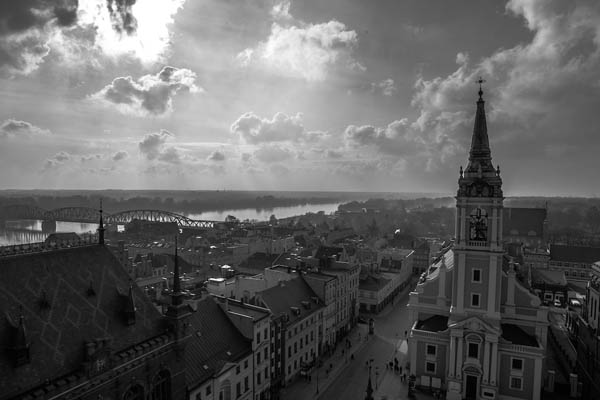
I may have heard of golden algae, but it sounds precious.
Yes, for sure but, as we see, the results are poor for the fish and for the whole wildlife in the river. Not all people are aware of the fact that we have so many fish in the river. I was surprised because I thought that we don’t have so much.
You’re like, “Wow. That is what’s under our river.” I was walking around the area on one of the bridges there nearby in the city center which is a very cool place, by the way. That setup is interesting.
People like to party a lot there. Sometimes they’re too loud.
It’s interesting that there’s an island designated for that and I saw a beaver.
Was the beaver alive?
It was a living beaver. It wasn’t trying to socialize with people. I imagine it was looking for food. Here’s this beaver and it’s on one side of the walkway. There’s a crowd of people. We stopped and everyone’s taking a video of it. It slowly made its way towards the river again and it was wet. It looked sad but I don’t know what a happy beaver looks like either.
This whole situation is complicated because some media outlets want to make political gains from this situation.
That seems standard though, doesn’t it? Isn’t that classic?
Probably.
How so?
It’s sad. It’s a tragedy, but it’s harder to say whose fault is it.
Especially if the people don’t know how it grows or how it got there.
[bctt tweet=”A city council meeting with everybody to hear them out is physically difficult to do. Proper strategies must be put in place to make this somehow possible.” username=””]
We don’t know if it was a spill, if some artificial substance got there or if it’s more natural. It’s hard to say.
We were talking about the river and the beavers.
The river is pretty important because it’s part of Wrocław. We have many islands inside the city and boat rides everywhere.
It encapsulates the main area.
The meaning of this river will grow in the future probably and Wrocław will have more benefits from having this river in the future because we will have more traffic probably on this river and people will gather more often in the future. We will have more buildings in the future as well because of the beautiful view and its nature.
It creates a wonderful visual experience.
There are a bunch of bridges here. We have 100 bridges that you can travel by bike. This is something unique. You have many ways to spend your time. If you have lived in Wrocław for many years, it’s not as astonishing for you. It’s so surprising. It’s not so wonderful because you get used to it, but for a person who comes here, it’s something interesting and nice.
The grass is always green. Isn’t it?
The people in Wrocław are nice. They are friendly. This is something also unique for Wrocław.
Most people you encounter speak English, at least, in the service domain, or maybe if you’re under 40, it’s a good percentage you speak some English. If you’re in college, you probably speak great English.
This is something connected to age. People learn English because they need to identify with that part of the world.
The word YouTube has come up a lot when I’ve spoken to people about this. YouTube’s basically in English.
Most of the interesting content is in English. English is pretty easy for us. It’s much more difficult to learn Polish than to learn English.
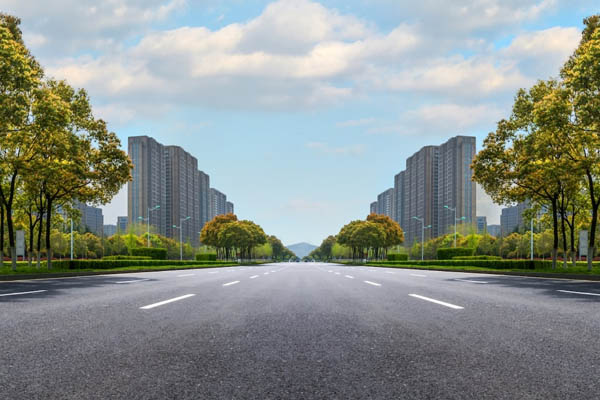
That’s my experience.
I’m sure it’s harder.
You have three consonants back to back that, as an English speaker, you don’t know what to do with it in your throat. It’s hard to make that smooth without a lot of practice but it’s quite pleasant because it looks harsh. When you look at it, you’re like, “That’s a lot of consonants,” but when you do it, it’s quite soft, smooth, and pleasing. It’s not that harsh. I am starting to learn a language a little bit, but it is hard to learn. You conjugate everything.
When you deal with a lot of the stuff that goes on in the city, when you’re dealing with these issues, whether it’s agreeing, which is an easier one, or disagreeing, which can create disharmony in the setting of trying to figure out what we should vote on here and how do we vote on it? Where is all the information coming from and what is true and what isn’t? Would you say that it’s generally civil between council members and how you come to solutions and how you arise a common ground to get to vote?
We argue, but it’s on a civilized level. There are not many scandals coming from the city council. If there are some scandals, they are usually connected to some things which were said by the major, because this is the way he decided to communicate. This is probably his strategy because if he creates scandals, people talk about him. You get more popular, etc.
What do you mean when you say scandals?
Maybe a scandal is too big of a word.
It’s something dramatic, in general.
For example, you write something which is controversial or you name something in a controversial way because let’s say part of the communication of a Wrocław major is going through Facebook. Let’s say there’s some communiqué coming from the president and then somebody argues with that communiqué. He’s either banned. He cannot comment anymore or he gets a comment, which is unpleasant. This is one of the areas in which you can create some scandal. There are other areas.
In the nature that it creates controversy and people start getting hung up on it. You get extreme viewpoints that get to start pouring out that everyone starts the loud squeaky wheel.
Also, if he names somebody that he is stupid. He doesn’t know what he’s talking about. I won’t speak with you. Your arguments are trash and things like that. This is something that creates conflict but it also generates publicity.
I don’t know all of those things that he’s necessarily doing or not doing but I will say it sounds familiar.
These strategies are applied in many places because they generate publicity and some politicians choose this part because it creates some benefits for them. If people say about you, you are popular despite that some people will not vote for you because of those.
[bctt tweet=”Mechanisms must be put in place when city councils hear what the people have to say. Without it, meetings would be limitless. There must be a compromise between the amount of free speech and the ability to work.” username=””]
Popular doesn’t mean they favor you or not. Popular only means you’re getting attention. Are there opportunities for the public to comment at these council meetings? I’ve messed around on Facebook a little bit looking at some of the things that get posted by council members and it does seem like there’s plenty of stuff that we have. Everything’s an outrage if they don’t like something. It could get toxic a little bit.
The way the city council is structured doesn’t allow for many ways to speak what you want to say when the city council meets because it needs to go through a certain procedure and it’s not an easy procedure.
To have your voice heard at the council meeting.
You can come and try to protest, but it’s not an easy way. When you want to do it officially and you want to get your microphone and you want to say a few words, there is a day once a year, when we have what is called a report on the city or something like that. There’s a comment on how the city works, which is a thick book. Everybody can come and register. In practice, we have around 40 people who can come once a year. This is something that allows you to get and you can speak directly to the president and to the council.
However, not during your biweekly meetings.
You can try to meet with the president or the major, but I’m not sure how often he meets with people and how long it will take to get to the president. I’m not criticizing that because this is a huge city.
I’m sure he’s super busy.
It’s physically not easy to meet with everybody and to hear everybody. When it comes to the city council, the mechanisms that they don’t promote and maybe free speech is not a proper word, but having an opportunity to say what you want to say is not an easy way, but you have your city council members. You can email them. You can meet them. Theoretically, your city council member, the one you choose to communicate with should be able to represent you.
There is a mechanism. In Santa Monica, we have public comments in every meeting and those can go quite long, depending on how many people want to comment. Sometimes these meetings go like from 5:30 to 3:00 in the morning. They’ve put in some mechanisms to try to keep it down.
If we meet and it’s a commission. It’s called commission in Polish, but it’s probably also a proper word. For example, there is a commission that decides about planning issues. Access to this commission is much easier. If the people interested in some area get the information that this commission is working on some new development plan, they can contact the person who manages the commission and there shouldn’t be any obstacles in getting and coming to this meeting and presenting your view. This is a much easier way to have your voice heard. It’s not that bad.
It depends on how you look at it. Some can argue that it’s better. It saves time.
If you would create a mechanism in which almost everybody can say whatever they want, the city council wouldn’t work because if they meet for 5 days or 1 week. This meeting would be limitless so some mechanisms are needed. You need to create some compromise between the amount of free speech and the ability to work.
Do you think people feel that their voice gets heard enough or do you feel that there is still blame towards the government in that regard?

As I told you in the first part of our meeting, the major, the president of Wrocław has his own team and they work together and the ideas which result from those meetings, those work groups are not always things which people agree with because it was, for example, created in a very charismatic group of people. You need to hear different voices. You need to hear different perspectives to prepare good solutions and laws and it’s not always like that. People argue and they want to change the position of the president. It creates conflicts and there are areas and those areas grow in which there is a conflict.
If you were to put a couple of things together, a package of the best way that the entire process can be improved. I know you didn’t have time to think through this. I’m asking you on the spot, but this may be one of them that you just mentioned. Get into that a little bit.
The stretch of this should be that you try to get a compromise. If you want to get a compromise, you need to have many people and many different views. Probably this is a problem. Sometimes, they think that their idea is better. The group working with the president thinks that their view is the best and they don’t want to speak with anybody. It then creates conflict. We need to bear in mind that this is a poor way of governing the city. We need to take as many views as possible and create this solution, this law together with people, not only with your friends or the people who are your allies, etc. You need to open this process of decision-making as much as possible.
How would you do that?
It’s a matter of creating mechanisms around the municipality. You can try to do it, but it’s up to you if you’re going to do it. If you are the major, you decide whether you want to have this process as much open as possible or you want to have it closed. It’s also a matter of your team and if you have people who have worked in the city council for 30 or 40 years, I’m not saying that it’s bad, but they get used to something. As time passes, they are not so open to different views. They think that they know the best and they want to proceed in this way. You should put some air into this management. You need to get new people. You need to refresh your team. This should create a good outcome.
The cost of democracy is expensive, right?
Yes.
The more you listen to or hear as many voices and the more you create those mechanisms, the more time and energy it takes to process them, evaluate them, and go through the processes of having town hall meetings or on different issues. It can draw things out. A lot of times, we deal with it. Where do you find the balance between how far democracy should go on and on what issues should be democratic versus whether are people okay with trusting their leaders to make those choices?
In corporations, for example, let’s say the trend goes in the direction that you get as much knowledge and experience from your employees as much and you put it into your decision-making process. Probably this is the best way of going in the public sector. You should also create benefits for everybody.
You reward people.
You should get benefits when it comes to the optimal, the process, the decision, or the project will be the best if you get as much feedback as possible from your citizens.
How do you get them motivated to do that in a way that doesn’t overwhelm the system when a decision’s needed now or next time? When there are important pressurized decisions, there’s not enough time to engage people at that level.
This is, for example, a process like the other variable problem. It appeared quickly and you need to try to make decisions quickly, but if you govern a city, most of the time, you will have time to plan things. Because you govern a city, you probably think 50 years ahead. Many decisions can be or should be well. Most of the decisions can be done with as much feedback from the people as possible but it’s a choice of the person who gets votes and who becomes the major of the city. Some things are required by law, but the public that you get your information from the public is not enough all the time.
[bctt tweet=”When governing a city, always think at least 50 years ahead and get as much feedback from the people as possible.” username=””]
It’s one source of information. You probably say that academic sources of information complement the public view experience in politics. The people who have been there for 30 or 40 years sometimes come with that historical knowledge of how things work and what will happen. There’s a pie of where all the data needs to come from to feel like you’re making a well-balanced decision. I guess the real question is to figure out how to decrease polarity around issues.
Sometimes, it’s not necessarily always limiting polarity, but letting people understand that even when decisions are made and even if it goes against their belief system, it’s not necessarily terrible. It doesn’t mean that you should be offended and angry about it. Maybe you didn’t get this one. You’ll get the next one or, “Here’s why things were done this way.” How do we make nice of the situation in that way?
Not all people are ready for some compromise because some people think that it all has to go. They think it should go and they’re not able to make any compromise. If you live in such a big place like Wrocław, there are limits. There are things that won’t make everybody happy because there’s traffic. The air is not so clean as in areas where you have few homes. There are many limits and many unpleasant fixes and you need to be ready for that. If you choose this kind of living, you can go and live somewhere in some areas close to the mountains. We have hundreds of people in some areas.
When you move into a big city, you have to accept that.
You get benefits from that. It’s easy to change work. You get big access to culture. You have shopping centers or shopping malls and you can easily have lots of restaurants.
You get to see people. People like to see people. It’s like a weird thing, but knowing there are a lot of people.
Most of us appreciate that.
It’s a center for humans to interact. Too many to even comprehend like in the town center.
It’s something natural for people to live in cities. From one point of view, it’s natural but still, there will be people who will want to run away and live their own lives somewhere close to wildlife or things like that. Most of the people who choose the city have all the benefits and all the bad sides of living in a city.
Are there people that you have here called nimbies? Have you heard of this term? “Not In My Backyard.” These are people who agree philosophically with some big thing but they don’t want it to happen near them. Where do you find a good percentage of nimbies who like to focus their attention on what issues?
I’m sure that everybody wants to be able to travel faster from one area to another area but when a plan appears, which allows for some road construction to be done, they don’t want to have this road right next to their places.
I don’t want the noise.
In Poland, we have lots of trash. Every country has some problem with trash. As people, we generate lots of trash. This is the way we allow the industry to put those plastics into the system but we can limit that. The politicians can limit that and this idea of a circular economy is a good idea. Hopefully, we will go in that direction and we will use everything as many times as possible, in the future.
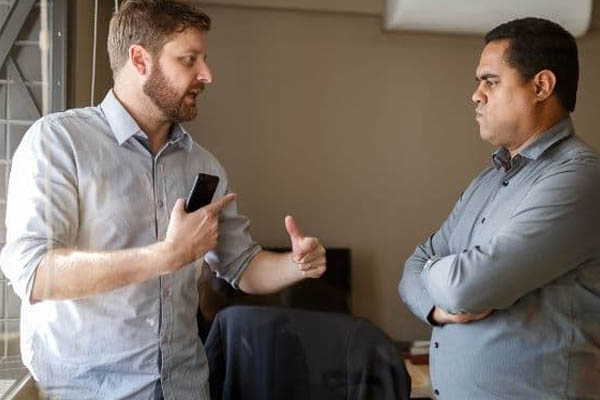
For example, if you want to get energy from trash, you build a special plant, and then you burn the trash in this installation. You get heat and electricity from that. If you ask people if they want to have less trash, more electricity, and more heat, everybody will say, “That’s a good idea,” or 80% will say yes, but if it’s a matter of building it close to your home or your area, you won’t find many people who will say, “Yes, I want to have this installation close to my area.”
Do you have that with affordable housing? The same issues where people agree in general that there should be housing that’s affordable for different types of people. It’s more affordable than the market rate in certain areas, but they don’t want it built next to theirs.
In Poland, maybe, but I would say that people in Poland don’t see it because we don’t have so many exclusive residential areas. Probably it might be like that in the future. We will have those expensive areas and the people might think that this new building will make our flats or apartments worth less because of that.
Do you mean it will reduce the value of their real estate?
Yes, but I don’t see lots of those conflicts because there are not many homeless people’s problems.
Why do you think that is?
We have municipal housing. If you want to get a job, there are lots of jobs. I would have to study the mechanism of homelessness in the US. I have to be ready for this answer but from my perspective, there are not many people who have this problem. Some people have this problem, but most of the time, it is their choice. They don’t want to live in a place where, for example, alcohol is restricted.
If you have places for homeless people, they restrict to under the influence of alcohol during the day. There are some people who won’t agree with these conditions. I would say that not all the time, not 100% of people who are homeless, are people who have chosen this type of lifestyle but most of the time, this is their choice. Still, there are places that want to take them.
You don’t have the level of mental illness, I imagine, because it adds a layer of complexity.
I get the impression that we don’t have a big problem with that, but I’m also not sure how it’s checked because we need to know that somebody has a mental problem. You need to get this knowledge from somewhere. We need to have lots of facilities. We have those facilities and more. We have specialized personnel who will help those people, but still, maybe it’s not a level we should have. Maybe we should have more of this assistance.
How about gypsies? The gypsy world here in Europe is super interesting.
There are countries where you have a big group of gypsies. There are tens of thousands of gypsies and they create their own culture. Not everybody is happy about this culture because they like to live in very specific housing. Not everybody from the aesthetic point of view likes that here but in Poland, we don’t have many groups of gypsies. There are some in Wrocław but most of them live in normal residential areas, normal flats, etc. Even if they speak a different language and they behave differently, it’s not a problem.
It’s an interesting culture though. We don’t have that.
[bctt tweet=”Because of COVID-19, people now live in a time when they dread what will happen the next day. Going back to those stable times in the past might take years.” username=””]
They want to live their own culture and let’s allow them to do it. There are not that many conflicts in Poland, but partly because we don’t have big groups of gypsies because you would have a city that has 200 Polish people and 100 Polish gypsies. It might generate conflict, but we don’t have such big groups of gypsies in Poland because in Slovakia and probably in the Czech Republic, they have big groups of gypsies and it creates conflict.
The idea of gypsies is like an underground community. It’s more European news than US news, like, “The king gypsy or the prince gypsy.”
Yes, but still, you have many minorities in the US. Polish society is rather homogenous or there were worst people who left Poland or what happened during World War II. We had a big minority of Jews, for example. There were many minorities in Poland and the gypsies as well. Nowadays, we don’t have a 100% of Polish society, but still, this country is a bit specific when you compare it, for example, with the United States of America, where you have lots of minorities. You have your own people who were always there.
I suppose there are a few European cities that I went to far and wide like London. It is a pretty big melting pot, which is interesting. I’m trying to think of other ones. Maybe Berlin.
For sure but probably don’t have so many minorities in Berlin, but London for sure is a city where you have people from all over the world.
It’s like a European New York-type experience.
For different areas in London and different cuisines in every area.
Do you think that adds to the level of compromise that’s possible? On one hand, you think while you have enough similarity where more people agree on common things, on the other hand, I could imagine that it’s like a reduced number of perspectives of how people think as well but you don’t have to deal with it.
In England, it’s up to the British people if they decide to invite those people into the decision-making process. If they invite them, the area of conflict is much smaller because they will be included. They won’t feel that they are not in the system and that nobody cares about what they think and what they want to do. It’s a matter of how we organize and how we design the system. In Poland, I’m pretty sure that many Ukrainian citizens will stay in Poland and we’ll create a future society. They will become part of society.
You’re now at 15% of Wrocław is Ukrainian or more. It’s significant. What is your experience now of dealing with it? The central government wants a lot of things but doesn’t always put forth the funds to get those. Is that your experience and how are you dealing with that?
As a society, we are open. We are helpful. We are sincere. It should work, whatever they choose. If they choose to stay, it should work. If they decide to go back, probably many of them will stay because of the time. If they spend here 1 year or 2 years, they get a job and their children go to school.
You’re building a foundation.
They’re becoming a part of this society and if they feel good here, I imagine that they can feel good here because people are rather open and helpful to them. It should work and the funds were prepared. In the beginning, it was important. The idea was to help in the beginning and then to start to get the people into the system to go to work and go to school.

You’re feeling that the situation with funding is okay now?
I’m not sure because I don’t work with this group of people. If you ask people on average, if it’s enough, they will always say, “It’s not enough.” It’s hard to say, but the funding was generous in the beginning, objectively speaking. The situation with the war was so expected. I’m sure that a small group of politicians knew that something was going on and that it might happen, but most people were surprised when they found out that Russians had entered Ukrainian territory for the second time. The war was going on. The conflict was maybe frozen, but it was going on in the Eastern part of Ukraine. Everybody thought that it would go like that for years and nothing more would happen.
Now, you have a war. It’s something unexpected and people were used to having a good economic situation. They were used to times when you know what will happen next year. We now live in times where you don’t know what will happen the next day. Because of COVID and the geopolitical situation, things have changed in many ways. I’m not sure if we will go back to those stable times we had. It might take years. We need lots of time to bounce the economy. The next factors may appear, which will spoil this thing.
We got monkeypox now in the US. How did monkeypox make its way here? You got nice monkeypox stuff going on. I thought of variations of COVID, sure, but monkeypox? That came out at a left field a little.
Is it in your area or it’s everywhere?
In California or in Santa Monica, there are cases popping up. It’s not quite what we were dealing with. The regulations now have been the loosest they’ve been since the COVID lockdown started and all that. I don’t think it’s creating enough of a scare that people are doing anything differently too much. That’s my experience of it, but it’s a little different with stuff here. Somewhere between the media and the conversation we were having before and how people perceive living.
We were talking a little bit about mass culture. I’ve been here for almost a month now in Wrocław and I don’t think I’ve seen a single person. I was in Kielce for almost a month. Again, there is not a single person wearing a mask and maybe a couple of sporadic people but it’s close to zero or 0.0001 or something. Even if I go back home right now, I’ll see people walking on the street with masks. Some do. Some don’t. It’s mixed.
What do the authorities say? Is there some recommendation telling people to wear masks, but it’s not an obligation? It’s better to have those masks on or authorities don’t say anything? How does it work?
It started at the CDC level. You can have some national mandates. We didn’t see that. You end up with local mandates or statewide mandates. A lot of the powers shifted to the states for these, which is why there was such a difference between how California did things and how Texas and Florida did things. It’s different. I was in Dallas during the lockdown and I saw plenty of people wearing masks, too. Not as many, but people have a different culture as opposed to California, which seems to be more like, “You’re on this.” It got super political.
In 2020, when it all started, there was a law requiring you to wear a mask even if you were outside. Most people, I would say 90% of the people wear masks outside. Later on, it all changed and if you were, for example, on public transport or in the shopping mall, you had to wear a mask. Maybe people get so tired of it that nowadays they don’t wear masks at all. Most people are not afraid of COVID. I’m not saying that they think that it doesn’t exist. They know that it exists and may be harmful, but they were so tired of all of this mess created by COVID that this is their reaction.
They don’t want to have anything to do with COVID and they don’t want to wear a mask. They want to forget about it. It may come back but we all have experience with COVID now. We know that some people will react and will have serious problems with their health and there are people who won’t react. This probably has something to do with your genome. Some people are more fragile, others are not. People who have some health problems, if they are older, they are in the risky group and they should wear masks. I see people wearing masks. Usually, these are older people. Probably they had COVID before and it was a hard time for them and they don’t want to have it again.
We didn’t see a lot of Americans and what if they have had it here? The encouragement for exercise, eating well, and building your immunity, I didn’t see that. I can remember a single federal state county or local message that says, “You can get this. The best thing you can do is not sit on your couch and watch TV. The best thing you could do is get healthy. Be in your best possible health.” Most people know that’s true, but I didn’t see any messaging for that. I’m wondering. Did you see a message for that here?
In the beginning, everybody was so frightened that it wasn’t a priority to think about their immune system. The priority was to try to get the system to work. That’s why such a communique wasn’t generated. There was a threat that the whole public health system. If you will have so many sick people, it will all collapse. This is my interpretation of that. Later on, I’m trying to think if we had information to try to solve ourselves.
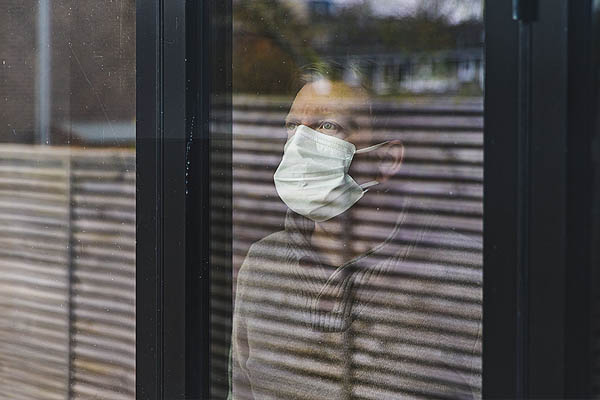
That came up to me and I try to ask people why from different places.
It’s an interesting perspective that a message could come and could try to encourage people but on the other hand, you have a problem with gyms, for example, because people gather there, right?
You wouldn’t be able to go to a gym. You have to do a lot of street workout parks.
You need to go to the forest.
I’ve gone to your street workout parks. I look for them. I hunt for them here because there are awesome.
You will find some. This was probably an issue because officials may have thought, “How can we encourage people if we don’t allow them to go to gyms or we limit the number of people who can go to the gym?” In Poland, lots of people go to gyms nowadays. Most of this health effort is done through gyms. This was probably the reason why this perspective hasn’t appeared here.
I’m getting lost in our conversation here because it’s great and engaging. I want to thank you for being here and taking the time. This was great. I’ve learned plenty.
We come from different parts of the world, but still, there are many aspects that we agree on and we see it in a similar way. We also work in a similar way in many ways probably on a local level and our local governments still work on similar regulations more or less.
Hopefully, we can find ways. There are a lot of different communities who do things in different ways around the world that can all be brought back to the communities we live in and people like yourself.
People have to be interested in their area. If somebody will do it for me, it won’t work. You need to take your power and try to serve things and then it should work.
Thanks again.
Thank you.
I appreciate it.
All the best.
This will hopefully inspire some people to get involved and help make a change in their own local communities in positive ways.
If you do nothing, the probability that things will change without you is small. You need to engage.
Here’s to engagement. Thank you.